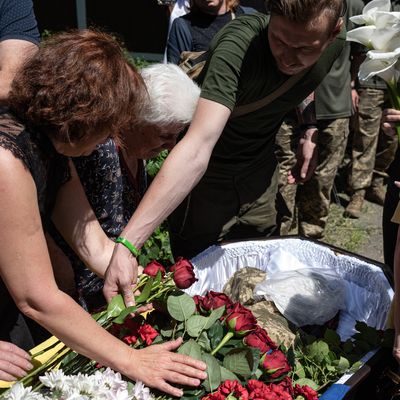
President Joe Biden told donors at a Democratic fundraiser on Friday that Ukrainian president Volodymyr Zelenskyy was reluctant to believe U.S. intelligence that indicated Russia would invade. “I know a lot of people thought I was maybe exaggerating,” Biden reportedly said about his warnings regarding Russia’s plans. “But I knew we had data to sustain [Vladimir Putin] was going to go in,” he added, “There was no doubt, and Zelenskyy didn’t want to hear it.”
The Associated Press reports that “the remarks came as Biden was talking about his work to rally and solidify support for Ukraine as the war continues into its fourth month.” If so, highlighting how Ukraine’s president (and current wartime leader) was caught flat-footed might not have been the best way to do that.
Zelenskyy’s defiant response to the invasion quickly made him one of the world’s most celebrated leaders. But in the run-up to the war, he repeatedly dismissed the idea that Putin would pull the trigger. By most accounts, nearly everyone in Ukraine was caught off guard by the attack, despite the fact that Russia had been conspicuously undertaking a massive military buildup along the border, in addition to the repeated warnings from the U.S. intelligence community and others. Zelenskyy downplayed the chances of war, in part, to insulate Ukraine’s economy, he said at the time.
That lack of preparation might have been far more costly if not for Russia’s strategic blunders on the battlefield, in addition to the Ukrainian military’s quick and effective efforts, backed by Western aid, to repel the invading forces.
Nearly four months later, though Russia suffered a costly and embarrassing defeat when it tried to seize Kyiv, its renewed ground offensive to take control of Ukraine’s Donbas region appears to be working. A Zelenskyy adviser told the BBC this week that between 100 to 200 Ukrainian soldiers are being killed every day as they face a relentless barrage from Russian artillery and rockets. The New York Times reports that Ukrainian forces on the front line in Donbas are running out of the critical shells for their older, but more numerous, Soviet and Russian artillery pieces. It’s not clear whether or not those pieces can be phased out and replaced with newer Western weapons in time to stop the Russian advance. Russia has also encircled Severodonetsk, which is the biggest city in eastern Ukraine still held by Ukrainian forces. Meanwhile the economic impact of the war, which has knocked out a significant amount of the global food supply, continues to look dire.
As The Guardian’s Shaun Walker reported earlier this month, it’s not clear that more preparation by Ukraine for the invasion would have made a decisive difference. Questions and concerns about Ukraine’s preparations linger, however, and it seems there is definitely appetite among Ukrainian politicians to investigate the matter — if and when the war ends.






























